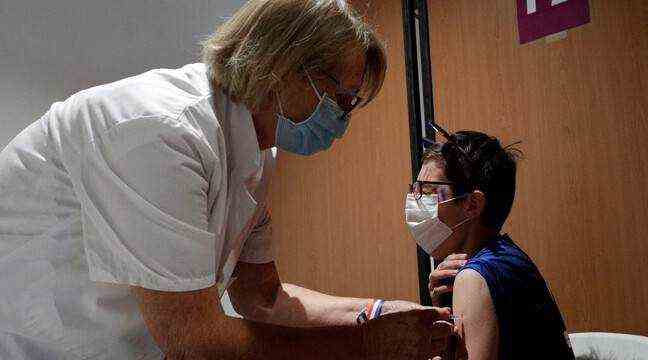This Thursday, the government set new vaccine targets against the coronavirus. A classic of the executive, after the 10 million people vaccinated (having received at least one vaccine injection) for mid-April, 20 million for mid-May and 30 million for mid-June.
These three milestones have been reached each time, with even a few days in advance for the last one. The new horizon is for the end of August, and includes five vaccination targets. 20 minutes make the point.
What are the goals for the end of August?
Forty million people must have received an injection, of which 35 million must be fully vaccinated (with two doses of Pfizer-BioNtech, Moderna or AstraZeneca vaccine, a single dose in case of Covid-19 infection before, or with a dose of Jansen). This is the first time that the government has noted a complete vaccination course and no longer reasons only in number of doses.
The other three objectives are also sharper and more precise than usual, with the appearance of percentages: 85% of over 50s and 75% of over 18s should have received at least one dose of vaccine. 66% of adults in France must be fully vaccinated.
Will the glass ceiling compromise the goals?
Intuitively, one would think so. The doses are there, and between mid-April and mid-June, France turned at a rate of 10 million first-time injections per month, and now she leaves herself two and a half months to spend an additional 10 million. Better still, as of June 21, 32,256,464 people have received at least one dose of vaccine and 18,734,028 people are fully vaccinated. Even if no first dose were administered by the end of August, there would be more than 32 million people fully vaccinated (reminders to be taken at the time of the first dose), three million from the target set by Jean Castex. And you don’t even need eight million first-time injections in over two months.
Too easy ? Not really, because the rate of the first vaccination probably reached its peak in April-May. From mid-May to mid-June, the number of appointments on Doctolib for a first dose increased from nearly 300,000 to 130,000 on average and the number of first-time injections performed each day increased from 480,000 on average per day on May 21 has only 240,000 as of June 21. In short, it is falling dramatically, and the trend even seems to be increasing.
How to explain it? For Hélène Rossinot, “those who wanted and had easy access to the vaccine have surely almost all been vaccinated for the first time now. We arrive at younger and less motivated people, ”she notes. Concretely, France has reached a kind of glass ceiling, where the populations most receptive to the vaccine have finished exhausting their stock of volunteers. Vaccination is barely increasing in the population over 60 years old, while around 20% of people still need to be vaccinated.
Vaccination has also slowed down considerably among people over 50, while 33% of this population remain to be vaccinated for the first time. This is perhaps the most ambitious objective of this August plan: 85% of people over 50 years of age first vaccinated, a very high level while all these age categories are stagnating or slowing down very sharply. Hélène Rossinot does not say anything else: “It will be very difficult but it is important to have ambitious objectives and that corresponds overall to what it would be necessary to achieve to avoid a fourth wave of hospitalization”, most hospitalizations , resuscitations and deaths concerning people over 50 years old.
For the moment, this slowdown in the fifties and over has been offset both by the second doses, but also by the opening up to vaccination to new categories of the population. Most recent, adolescents from 12 to 17 years old. But the more we go down the age groups, the fewer volunteers and supporters of vaccination. This compensation strategy, if it is important to target collective immunity, is therefore beginning to reach its limits, as shown by the drop in primary vaccinations.
Is summer a problem?
Yes, and rather twice than once. First, it is necessary to make an appointment for a second dose in the same vaccination center as the first dose (although in itself it is possible to change this after on Doctolib), a problem that can sometimes be limiting during the holidays. Beyond these logistical concerns, this is not the best time to think about vaccination. “I hear a lot of people who say they wait until September / October, the period is more frivolous and the sense of urgency has disappeared,” warns Hélène Rossinot.
Can the Delta variant be a game-changer?
The Delta variant is currently responsible for 10 to 12% of contagions in France, according to Public Health France. According to some studies, it is 60% more transmissible than the Alpha variant, itself 50 to 74% more transmissible than the original strain of Covid-19, and should in all likelihood become the majority in France. Hence the importance of increasing vaccination coverage, while countries with populations more vaccinated than ours, such as the United Kingdom or Israel, see their number of cases increase due to this variant.
Paradoxically, will Delta’s rise to power be a good thing, to convince the recalcitrant to be vaccinated against this more contagious and dangerous variant? Not sure, sighs Hélène Rossinot: “I would really like to avoid a fourth wave, but I’m afraid people will only understand the importance of vaccination when things are shit against Delta and not before. It is up to the government to succeed in making her lie.

